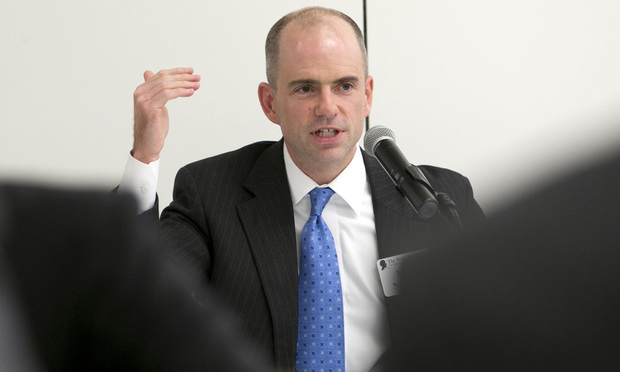'Judicial Charade': 11th Circuit Judges Polarized on Sentencing for Violent Crime
The prisoner challenging her long sentence lost. The dissenting judges said the ruling will also adversely affect many others.
October 08, 2018 at 05:55 PM
7 minute read
The original version of this story was published on Daily Report
 11th Circuit Judge Kevin Newsom. Photo: Alison Church
11th Circuit Judge Kevin Newsom. Photo: Alison Church
Nuts. Judicial charade. Mess. Those are not words judges typically use to describe their own work. But that's what the U.S. Court of Appeals for Eleventh Circuit did in a 5-4 en banc split debating federal career criminal sentences for violent crime.
The 153-page package released Thursday includes a majority opinion from five judges, a concurring opinion from the same judges explaining their reasoning and two dissents joined by the four judges in the minority — plus a call for help from Congress to rewrite the Armed Career Criminal Act of 1984.
The full court review hinged on whether it followed a conduct or categorical standard for assessing a violent felony and affirmed using the conduct standard. The original panel followed up Tuesday with an unsigned opinion affirming the sentence based on conduct.
The dissenting judges on a politically polarized court said the ruling will hurt many others.
“The question before us is whether one of the key provisions of an important federal criminal statute, 18 U.S.C. § 924(c), is unconstitutionally vague,” Judge Kevin Newsom wrote for the majority. The law “makes it a federal offense — punishable by a term of imprisonment ranging from five years to life — for any person to use, carry or possess a firearm in connection with a 'crime of violence.' ”
Irma Ovalles challenged the law's residual clause, which defines the term “crime of violence” as a felony “that by its nature, involves a substantial risk that physical force against the person or property of another may be used in the course of committing the offense.”
Ovalles was represented by W. Matthew Dodge of the Federal Public Defender's Office in the Northern District of Georgia. He said he would file a cert petition in the U.S. Supreme Court.
The opinion ”will prove fatal to dozens, if not hundreds, of cases in our circuit. Meanwhile, the circuit courts across the country are deeply divided. The government has filed cert petitions in some of the cases it has lost, and many defendants have done the same. We will join the parade soon,” Dodge said.
Arguing for the government was Assistant U.S. Attorney Jane McBath, chief of the appeals and legal advice division in the North District. The office spokesman did not respond to a request for comment by deadline.
“In 2010, Irma Ovalles was charged by information with six robbery- and carjacking-related offenses, all of which arose out of what can only be described as a three-day crime binge,” Newsom said. The summary of evidence showed “Ovalles and her co-conspirators robbed a grocery store, successfully carjacked three automobiles by force and attempted to carjack a fourth.”
Ovalles pleaded guilty to all six counts. She was sentenced to nine years for each count to run concurrently plus a consecutive 10 years under the residual clause.
Newsom concluded that, if the law is read using a categorical approach, the clause Ovalles challenged is “doomed.” That reading requires judges to overlook the action in question to consider whether the average crime of the same sort would carry a risk of violence.
“On the flip side,” he said “the provision is not unconstitutionally vague” when applying a “conduct-based approach” using real world facts.
Newsom invoked the canon of “constitutional doubt,” saying the U.S. Supreme Court has long held that “every reasonable construction must be resorted to in order to save a statute from unconstitutionality.”
Judge William Pryor wrote a separate concurring opinion, joined by Newsom, Chief Judge Ed Carnes and Judges Gerald Tjoflat and Elizabeth Branch. The majority opinion included those, plus Judges Stanley Marcus, Robin Rosenbaum and Frank Hull.
“How did we ever reach the point where this court, sitting en banc, must debate whether a carjacking in which an assailant struck a 13-year-old girl in the mouth with a baseball bat and a cohort fired an AK-47 at her family is a crime of violence?” Pryor wrote. “It's nuts. And Congress needs to act to end this ongoing judicial charade.”
Pryor said he fully joined Newsom's majority opinion, “but I write separately to explain why our resolution of this appeal forecasts how Congress should address the vexing issue of how to punish violent recidivists under laws like the Armed Career Criminal Act.”
The solution lies in “restoring the traditional role of the jury,” Pryor said. “The caselaw about how to punish recidivists has confounded the federal courts for decades and has made the resolution of this appeal tricky, but our decision also suggests a way out of the mess.”
Pryor said the “obvious solution” is for Congress to “rewrite the Armed Career Criminal Act and other recidivist statutes to require that the government must prove to a jury beyond a reasonable doubt that the defendant has previously been convicted of a felony, the actual commission of which involved the use, attempted use,, or threatened use of physical force against another person.”
He added, “Tasking the jury with determining recidivism is consistent with the common law.”
But Judge Jill Pryor said the majority was wrong and its decision “perpetuates unconstitutional sentences” for other prisoners. Pryor was joined by Judges Charles Wilson, Beverly Martin and Adalberto Jordan.
“This case — with all its textual analysis, discussion of canons of statutory construction and parsing of precedent — may come across like a purely academic exercise,” Jill Pryor said. “In reality, it is anything but. People who are serving sentences of five years to life under § 924(c) will get no relief from this court even though the Supreme Court held that an identically worded statute was so vague that its enforcement violated the right to due process under law.”
While agreeing with Jill Pryor, Martin wrote a separate dissent saying the decision reflects many others that she believes have left prisoners with overly harsh sentences.
Circuit judges “ have been given great power and privilege. And our positions call upon us to decide the fate of many people who have neither,” Martin said. “In a nation that incarcerates a larger percentage of its population than almost all others, federal judges devote much time to examining (and reexamining) the sentences imposed on people serving time in our federal and state prisons. The interpretation the majority of this en banc court gives to the sentencing statute at issue here, which gives no relief for Irma Ovalles, presents the opportunity to review the development of this circuit's sentencing jurisprudence in recent years.”
Martin said her review shows her colleagues are keeping people in prison for longer than necessary.
“Decisions of this court have left only a narrow path to relief for those serving sentences longer than the law now allows. Yet this narrow path is not mandated by decisions of the Supreme Court or by Acts of Congress. Indeed, this court has withheld relief from prisoners even when precedent counsels otherwise,” Martin said.
“At every turn,” Martin said her colleagues in the majority have “erred in ways that stopped prisoners from getting their sentences reviewed and prevented people who had meritorious claims from getting relief.”
Circuit Judge Frank Hull wrote for the panel last year and participated in the en banc review but was barred as a senior judge from voting.
The case is Ovalles v. U.S.A, No. No. 17-10172.
This content has been archived. It is available through our partners, LexisNexis® and Bloomberg Law.
To view this content, please continue to their sites.
Not a Lexis Subscriber?
Subscribe Now
Not a Bloomberg Law Subscriber?
Subscribe Now
NOT FOR REPRINT
© 2025 ALM Global, LLC, All Rights Reserved. Request academic re-use from www.copyright.com. All other uses, submit a request to [email protected]. For more information visit Asset & Logo Licensing.
You Might Like
View All

Holland & Knight Expands Corporate Practice in Texas With Former Greenberg Traurig Partner
3 minute read
Forum Clause Axes $844M Case Against Reinsurer Over Deadly Plane Crash, Judge Rules

Latest Boutique Combination in Florida Continues Am Law 200 Merger Activity
3 minute readTrending Stories
- 1Rejuvenation of a Sharp Employer Non-Compete Tool: Delaware Supreme Court Reinvigorates the Employee Choice Doctrine
- 2Mastering Litigation in New York’s Commercial Division Part V, Leave It to the Experts: Expert Discovery in the New York Commercial Division
- 3GOP-Led SEC Tightens Control Over Enforcement Investigations, Lawyers Say
- 4Transgender Care Fight Targets More Adults as Georgia, Other States Weigh Laws
- 5Roundup Special Master's Report Recommends Lead Counsel Get $0 in Common Benefit Fees
Who Got The Work
J. Brugh Lower of Gibbons has entered an appearance for industrial equipment supplier Devco Corporation in a pending trademark infringement lawsuit. The suit, accusing the defendant of selling knock-off Graco products, was filed Dec. 18 in New Jersey District Court by Rivkin Radler on behalf of Graco Inc. and Graco Minnesota. The case, assigned to U.S. District Judge Zahid N. Quraishi, is 3:24-cv-11294, Graco Inc. et al v. Devco Corporation.
Who Got The Work
Rebecca Maller-Stein and Kent A. Yalowitz of Arnold & Porter Kaye Scholer have entered their appearances for Hanaco Venture Capital and its executives, Lior Prosor and David Frankel, in a pending securities lawsuit. The action, filed on Dec. 24 in New York Southern District Court by Zell, Aron & Co. on behalf of Goldeneye Advisors, accuses the defendants of negligently and fraudulently managing the plaintiff's $1 million investment. The case, assigned to U.S. District Judge Vernon S. Broderick, is 1:24-cv-09918, Goldeneye Advisors, LLC v. Hanaco Venture Capital, Ltd. et al.
Who Got The Work
Attorneys from A&O Shearman has stepped in as defense counsel for Toronto-Dominion Bank and other defendants in a pending securities class action. The suit, filed Dec. 11 in New York Southern District Court by Bleichmar Fonti & Auld, accuses the defendants of concealing the bank's 'pervasive' deficiencies in regards to its compliance with the Bank Secrecy Act and the quality of its anti-money laundering controls. The case, assigned to U.S. District Judge Arun Subramanian, is 1:24-cv-09445, Gonzalez v. The Toronto-Dominion Bank et al.
Who Got The Work
Crown Castle International, a Pennsylvania company providing shared communications infrastructure, has turned to Luke D. Wolf of Gordon Rees Scully Mansukhani to fend off a pending breach-of-contract lawsuit. The court action, filed Nov. 25 in Michigan Eastern District Court by Hooper Hathaway PC on behalf of The Town Residences LLC, accuses Crown Castle of failing to transfer approximately $30,000 in utility payments from T-Mobile in breach of a roof-top lease and assignment agreement. The case, assigned to U.S. District Judge Susan K. Declercq, is 2:24-cv-13131, The Town Residences LLC v. T-Mobile US, Inc. et al.
Who Got The Work
Wilfred P. Coronato and Daniel M. Schwartz of McCarter & English have stepped in as defense counsel to Electrolux Home Products Inc. in a pending product liability lawsuit. The court action, filed Nov. 26 in New York Eastern District Court by Poulos Lopiccolo PC and Nagel Rice LLP on behalf of David Stern, alleges that the defendant's refrigerators’ drawers and shelving repeatedly break and fall apart within months after purchase. The case, assigned to U.S. District Judge Joan M. Azrack, is 2:24-cv-08204, Stern v. Electrolux Home Products, Inc.
Featured Firms
Law Offices of Gary Martin Hays & Associates, P.C.
(470) 294-1674
Law Offices of Mark E. Salomone
(857) 444-6468
Smith & Hassler
(713) 739-1250






